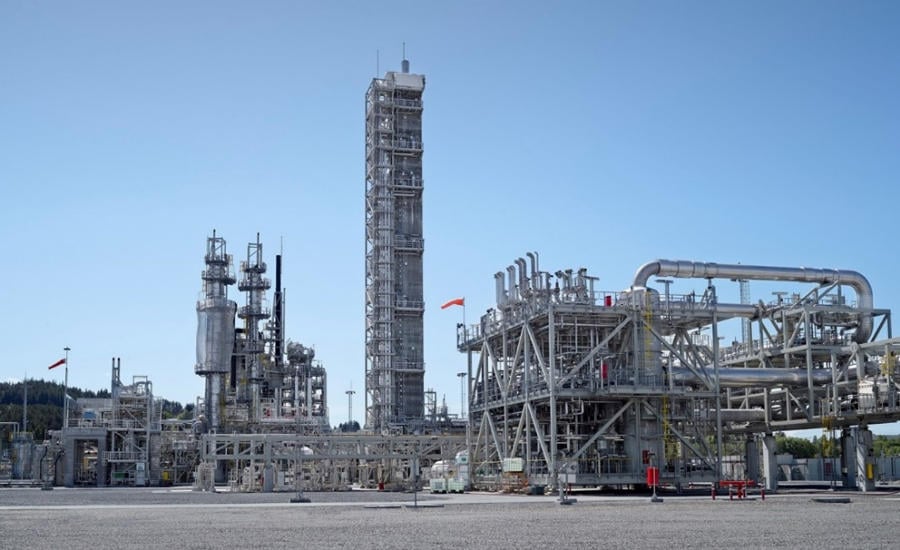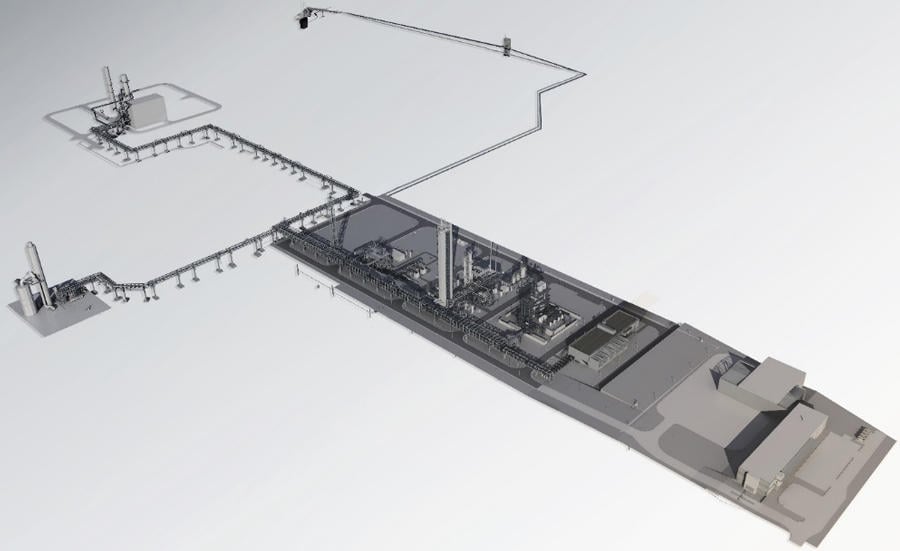Press Information
Mitsubishi Heavy Industries Engineering to test carbon capture technology at Technology Centre Mongstad in Norway
Technology Centre Mongstad
・ Testing of proprietary solvent KS-21TM will start from May 2021 at TCM
・ TCM offers state-of-the-art facilities and expertise to ensure successful demonstration
・ MHIENG aims to expand its carbon capture business in the United Kingdom and Europe

Technology Centre Mongstad located at the west coast of Norway
Mitsubishi Heavy Industries Engineering (MHIENG), part of Mitsubishi Heavy Industries (MHI) Group, has entered into an agreement with Technology Centre Mongstad (TCM) to test its proprietary solvent for capturing CO2 at the amine plant located in Mongstad, Norway. The test campaign will start in May.
The proprietary solvent to be tested is the KS-21TM, an amine-based adsorbent used in the “Advanced KM CDR ProcessTM” newly developed by MHIENG in collaboration with Kansai Electric Power Co., Inc. (KEPCO). Its long-term usage will be demonstrated in Norway, one of the world’s most advanced countries with respect to environmental regulations on CO2 capture, in a quest to achieve commercialization within 2021. Compared to the earlier KS-1TM solvent, which has been adopted at 13 commercial plants delivered by MHIENG, KS-21TM has a number of advantageous properties such as lower volatility and greater stability against degradation. The newer solvent is also expected to enable reduced running costs and other economic benefits.
At a time when CO2 capture needs are expanding in the United Kingdom and Europe, the test program at TCM, which has state-of-the-art facilities and specialized knowledge, will confirm KS-21TM’s long-term durability and assess its environmental impact, thus providing MHIENG with technological data relating to its significantly higher CO2 capture rate. The test program will enable MHIENG to set a timetable for KS-21TM’s commercialization, opening the way for the company to expand orders in the UK and European markets.
Since its establishment in 2012, TCM, equipped with the world’s largest-scale CO2 capture testing facilities, has provided users with profound knowledge, online analysis, and advanced analytical technologies relating to the trace components of gas emissions. Its data accumulated through testing exceed 1,000 categories and contribute significantly to commercialization of absorbents.
On reaching the new agreement with TCM, Kenji Terasawa, MHIENG President & CEO commented: “MHI Group today is strengthening its efforts in the energy transition field, to help realize a carbon neutral world on a global scale. For many years, MHIENG has strived to minimize CO2 emissions from gas emissions, utilizing its cutting-edge technologies. Today we possess reliable and economically feasible carbon capture technologies supported by more than three decades of research and development activity and a robust track record of commercial plants around the world. TCM’s abundant knowledge and experience in environmental impact assessment, and its state-of-the-art testing environment, will raise the level of our CO2 capture technologies further, enabling us to accelerate business expansion in the vital UK and European markets. We expect the new testing program will contribute to realizing carbon neutrality in the years ahead.”
Ernst Petter Axelsen, CEO at TCM, also welcomed the new collaboration. “It’s very satisfying that a leading capture technology developer like MHIENG has chosen TCM as the arena for their carbon capture tests. Our staff is ready to ensure effective execution of the tests, and to provide expert advice throughout the campaign.”
About KM CDR ProcessTM and Advanced KM CDR ProcessTM
MHI Group together with Kansai Electric Power Co, Inc. (KEPCO) started the development of the Kansai Mitsubishi Carbon Dioxide Recovery KM CDR ProcessTM, a post-combustion carbon capture technology, in 1990. As of February 2021, MHIENG has delivered a total of 13 commercial plants with the KM CDR ProcessTM, making it a global leader in carbon capture technology deployment. Two more plants are currently under construction.
During the test campaign, MHIENG’s proprietary KS-21TM will be tested, with comparisons to be made with its earlier KS-1TM solvent. KS-1TM is currently being used at all commercial plants that employ the KM CDR ProcessTM and has proven to be a competitive and reliable solvent of choice. MHIENG, with the support of KEPCO, has continued to improve upon the KM CDR ProcessTM and has recently developed KS-21TM. KS-21TM has many promising characteristics including lower volatility and greater stability against degradation, and MHIENG believes that these properties will result in operational cost savings making the Advanced KM CDR ProcessTM even more economical for future deployment. MHIENG is aiming to commercialize the new KS-21TM solvent within 2021.
For more information, please visit the following YouTube site about our carbon capture technology.
TCM offers unique test facilities
TCM’s test facilities for CO2 capture consist of an amine plant, a chilled ammonia plant, as well as an area for new, groundbreaking modular capture technologies. Both the amine and the chilled ammonia plants capture CO2 by means of a chemical liquid known as a solvent, consisting of a mix of water and either amine- or ammonia-based solutions. Starting in 2021, the site for modular technologies will be used for testing technologies such as membranes and adsorbents (solid materials that bind CO2).
TCM uses two different industrial live flue gas sources (fluidized catalytic cracker and combined cycle gas turbine) from Equinor’s refinery at Mongstad, with different content of CO2.
The amine plant is a unit with generic capabilities developed to serve as a demonstrator for solvent-based capture technologies. The unit has so far been utilized by five technology developers in addition to scientific testing using non-proprietary solvents (monoethanolamine and CESAR 1) for helping developments in the global carbon capture community.

Layout of the TCM plant, including the administration complex, amine and chilled ammonia plants, flue gas sources from the adjacent refinery, and a seawater cooling system.
About MHI Group
Mitsubishi Heavy Industries (MHI) Group is one of the world’s leading industrial groups, spanning energy, smart infrastructure, industrial machinery, aerospace and defense. MHI Group combines cutting-edge technology with deep experience to deliver innovative, integrated solutions that help to realize a carbon neutral world, improve the quality of life and ensure a safer world. For more information, please visit www.mhi.com or follow our insights and stories on spectra.mhi.com.






